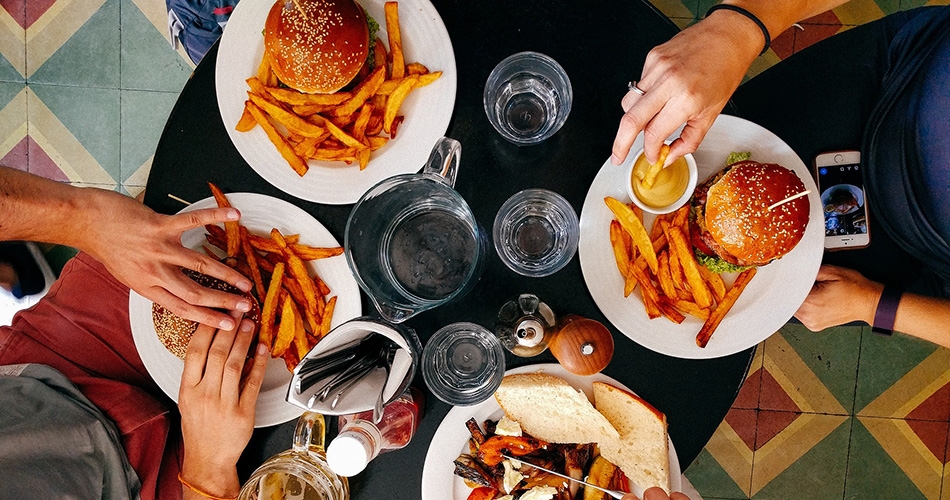
Cheat days and cheat meals – cheat correctly!
Cheat day vs. cheat meal
Cheat day is based on the idea that for 6 days you follow a strict diet, count the calories and macros, then on the seventh day you reward yourself with a cheat meal. This time anything is allowed that wouldn’t fit in your diet: fast food, cakes, sweets, soft drinks and alcoholic beverages. This way your metabolism that has slowed down during the lower calorie intake gets a bigger boost and it speeds up and turns the calories into useful and quick energy for the body.
Should you eat more to burn more calories? Well, that’s not really how things work. It’s true that your metabolism speeds up when you eat more, but if you take in 1500 calories all at once, your body will not suddenly burn 2000 calories.
Consequently, it is bad enough already if you exceed your daily carbohydrate and calorie allowance and give yourself everything you craved after the whole week just in one meal! Cheat day does not mean that you can eat and drink whatever you want all day long until you become sick. Cheat day is when you can sneak in a cheat meal.
Why is it still good to keep a cheat day?
The first reason is quite simple – because it feels good. It makes you happy and it gives you the feeling that life is not all about dieting. Not even the most determined athletes can live without some cheating with meals here and there. And besides the psychological reasons there are proven beneficial effects to it.
One positive effect can be linked to the hormone leptin, the so called satiety hormone. This hormone informs the brain about your reserve levels. If the level of your leptin is low or it reaches the threshold, it signals to the brain that you can leave the dining table because you have stored up enough calories. However, a lasting and extended calorie deficit will provenly reduce the quantity of this hormone, which makes it difficult to lose weight, but a little extra intake of carbohydrates will prevent a drop in the leptin levels.
Low-calorie and low-carbohydrate diets have a long-term adverse effect even on the functioning of the thyroid gland. The thyroid gland, among many others, is responsible for your metabolism, namely how many calories you burn during a day without any physical activity. However, when you take in less calories the level of the T3 (triiodothyronine) thyroid gland hormone decreases and your metabolism becomes slower.
In conclusion, you could say that cheat days only work when they are part of your diet, but the most important thing is moderation.
Where do most people make a mistake?
Some people spend their entire week planning what they would be eating at the weekend, they make a list of foods that they crave after and when cheat day comes they give a huge shock to their body eating for 10-12 hours lots of carbohydrate and sugar. A little pancake for breakfast with chocolate syrup, flavoured coffee with whipped cream, early lunch at your grandmother with the classic breaded and deep-fried meat, breaded and deep-fried cheese and French fries. Obviously, you will take the cake and cookies that grandma prepared and packed for you, it will be good as an afternoon snack and when it is gone you munch some chips/popcorn, then pizza and snacks while you are watching a film in the evening.
Why could all this happen? Your huge appetite and excessive craving for unhealthy food could come from a poorly assembled diet that results in severe carbohydrate and calorie deficiency. You focus on the goal. You torture yourself the entire week so you could get that well-deserved snack at the weekend. But you are causing more damage than good, since instead of cheating a little you create a total destruction.
What is the conclusion? The point is not to follow a very strict diet during the week, but to make it sustainable in the long run. This way you can eliminate binge eating and the reward will not be your cheat meal, but the visible result of your training and exercise.
This is how you should have cheat days in your diet.
Two pillars of well-functioning cheat days are moderation and timing.
We have talked about moderation in detail above, but one thing hasn’t been mentioned: cheat meals are not necessarily unhealthy. There are many different diets that are based on a changing calorie intake and they are full of varied, healthy dishes. If you have an inclination to junk food, then limit it only to one meal. If you are craving for pizza, share one with your friend and if you want to eat dessert take only one slice of cake at grandma’s or order only one dessert in the restaurant, and if you crave for chocolate, have only one row from the entire bar.
How should you time these meals? You shouldn’t eat such food before you go to bed, since it is a time when your body wants to rest. Lunch would be a better timing, and it’s even better if you make it useful – you will always need more calories for high intensity trainings, so do your leg training 1-2 hours after lunch. This way you don’t only burn the extra calories, but you can use the carbohydrate even to support your growth and development!
Are you interested in recipes recommended by BioTechUSA? Check out our gourmet recipes for cheat days or prepare one of our fitness desserts.

